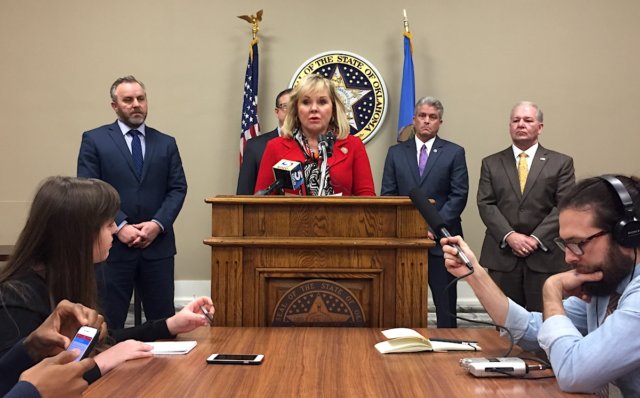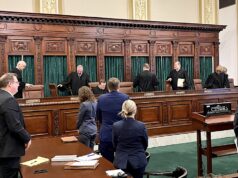

Gov. Mary Fallin announced this afternoon that she, legislative leaders and other stakeholders have come to an agreement on six criminal justice reform bills that she expects to be passed this session.
“These reforms are targeted toward non-violent offenders, many who suffer from addiction and mental health issues,” Fallin said. “The agreement also, I believe, is a huge first step in moving us forward toward our goal of reducing (prison populations).”
Senate Majority Floor Leader Greg Treat (R-OKC) said the Legislature can be expected to “expedite” the bills, which he said “will have a substantial impact on bed count” in Oklahoma prisons.
“Last year, we ran into some roadblocks. We didn’t have the district attorneys at the table,” Treat said, attributing importance to a meeting last week with Oklahoma district attorneys. “I said, ‘Once we start talking, we will get this done.'”
Treat, Rep. Terry O’Donnell (R-Catoosa), Pottawatomie County District Attorney Richard Smothermon and Oklahoma County District Attorney David Prater joined Fallin for Monday’s announcement.
“This has been a decade-long-plus process,” Prater said. “When we’ve been vocal, that’s what we’ve been vocal about. I’m proud to say we’ve been asked to the table and been a part of this process. This is a very positive move for Oklahoma.”
Fallin described six criminal justice reform bills — five of which remain alive in conference committee from last session — as part of the agreement. Fallin said language related to the agreement is still pending, but the bills are:
- HB 2281 which would create a tiered structure for property offenses based on dollar valuations and with lower punishment ranges
- HB 2286 which would create a streamlined administrative parole process and a “more comprehensive” aging and medical parole process
- SB 649 which would create a prison-reducing sentence enhancement structure for subsequent convictions of nonviolent offenses
- SB 689 which would address long sentences for drug trafficking and change supervisions processes
- SB 786 which would create a third-degree burglary charge with a lesser range of punishment
- A retooling of the drug-sentencing structure that will be placed into a yet-to-be-determined bill.
“Lastly, to make sure that we continue on in future years (the agreement will) establish a new future Criminal Justice Coordinating Council that will continue to talk about these issues,” Fallin said.
Prater called that component critical to continued criminal justice reform efforts, highlighting Section 991 of Title 22 (Crimes and Punishments) as one example of state statutes that have been “piecemealed together for decades.”
“The coordinating council will hopefully go back and re-write the criminal code in their future work,” Prater said.
Criminal justice reform bills controversial since 2017
In the 2017 regular session, the bills listed today by Fallin stalled in conference committee after concerns from district attorneys and then-Rep. Scott Biggs, a former prosecutor.
To no avail, Fallin hosted a press conference imploring Biggs and House leadership to advance the bills. In subsequent months, district attorneys and representatives of Oklahomans for Criminal Justice Reform sparred in news stories and public statements on the topic.
On Feb. 25, OCJR chairman Kris Steele — a former Republican speaker of the House — authored a commentary in the Tulsa World that blamed prosecutors for holding up criminal justice reform.
Asked about the piece Monday, Prater declined to respond to its accusations.
Steele released a statement shortly after Monday’s press conference expressing concern that specific bill language and “bed savings” projections were not announced.
“We’re glad to hear interest in advancing reform but discouraged no specifics were provided. It’s hard to determine whether this agreement is impactful because no prison bed savings projection has been made and no bill language was actually provided,” Steele said. “From what we’ve heard, this appears to be a proposal that grows the prison population, albeit by a lesser amount than other prosecutor proposals. Until we see specifics, we’ll be encouraging our leaders to keep pushing for the full task force plan that safely prevents prison growth and puts Oklahoma on a more stable path going forward.”
‘We have got to find savings’
Asked what details of the bills had been worked out now, Prater pointed to ranges in punishments, sentence enhancements and the state’s parole processes.
“When you get down to the details, that’s where you have concerns about what some of the effects might be,” Prater said.
Smothermon assured stakeholders in the room that “we’re not done yet” with criminal justice reform.
“We have got to find savings that we can then funnel to up-front mental health and substance abuse treatment,” Smothermon said.
He listed other changes, such as making sure possession of a stolen firearm is “always a felony, as it should be.”
O’Donnell referred to the agreed-upon criminal justice reform bills as a “cookbook” to achieve Fallin’s initial goals on the topic.
“When I became involved with the task force, the governor gave the task force some very simple goals: Reduce safely the incarceration rate in Oklahoma, save taxpayer dollars, explore alternatives to prison and keep families together,” O’Donnell said.
He added that the measures will help address Oklahoma’s nation-leading incarceration rates for women.
“Property crimes have a disproportionate effect on women’s incarceration rate,” O’Donnell said. “We’ve got to stop locking up those women. How long does it take before these kids get into the system? We’ve got to stop that cycle.
“We’ve got to be smarter on when we incarcerate women in this state.”




















